Russian artillery fire once again pounded the Ukrainian city of Nikopol overnight, according to Ukrainian officials.
Regional governor Valentyn Reznichenko said Russian forces struck the three districts of Nikopol, Kryvoriz, and Synelnykiv close to the Zaporizhzhia nuclear plant.
In an update posted to his official Telegram channel this morning, Reznichenko said:
A night of shelling and casualties.
Nikopol was shelled with ‘Grad’ and barrel artillery three times during the night. 42 Russian shells flew into the residential quarters.
In the city, two houses were destroyed, almost 50 were mutilated. Enemy shells damaged a kindergarten, shops, pharmacies, markets, a court and a bus station. The shelling caused five fires … Up to 2,000 people are without electricity.”
In the Sinelnyk district, an agricultural enterprise was reportedly destroyed as well as a school and a cultural centre.
Updated at 01.10 EDT
Key events
Show key events only
Please turn on JavaScript to use this feature
 Daniel Boffey
Daniel Boffey
Daniel Boffey reports for us from Tallinn:
Father Grigory Borisov offers a prayer for Ukraine every day in a special liturgy at the Lasnamäe church, a towering, whitewashed place of Russian Orthodox worship in the centre of the most populous suburb of Estonia’s capital, Tallinn, where a majority are Russian speakers.
The Church of the Icon of the Mother of God was built in 2013 with the help of funds from a Moscow-based NGO. While in March the Estonian Orthodox church joined other churches in the Baltic country in condemning the bombing of civilians in Ukraine, the church’s leader back in Moscow, Patriarch Kirill, has been accused of providing theological cover for Vladimir Putin’s war.
Borisov, 32, who went to theological college in St Petersburg, is treading a thin line. He says he is not permitted to talk about politics and the war. But the priest concedes there is widespread anxiety in his congregation in this economically deprived part of the city. “The mental health situation is bad – Covid, war, the economic situation, the gas prices. These things make people sad and worried.”
Read more here: ‘I’m always looking over my shoulder’: anxiety among Estonia’s Russians
Updated at 05.33 EDT
These are some of the latest images to be sent to us over the newswires from Ukraine.
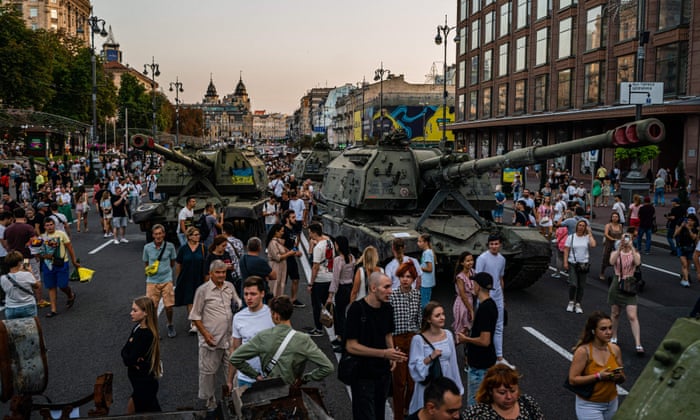 People look at destroyed Russian military equipment at Khreshchatyk street in Kyiv, that has been turned into an open-air military museum ahead of Ukraine’s Independence Day on August 24. (Photo by Dimitar DILKOFF / AFP) (Photo by DIMITAR DILKOFF/AFP via Getty Images) Photograph: Dimitar Dilkoff/AFP/Getty Images
People look at destroyed Russian military equipment at Khreshchatyk street in Kyiv, that has been turned into an open-air military museum ahead of Ukraine’s Independence Day on August 24. (Photo by Dimitar DILKOFF / AFP) (Photo by DIMITAR DILKOFF/AFP via Getty Images) Photograph: Dimitar Dilkoff/AFP/Getty Images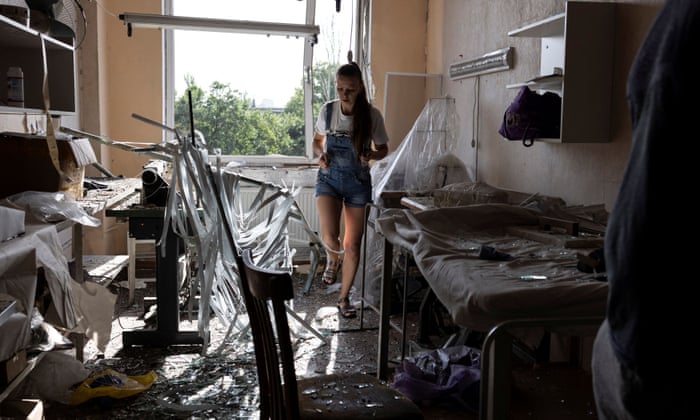 A local business owner inspects her sewing workshop damaged by a Russian missile strike in Mykolaiv, Ukraine. REUTERS/Umit Bektas Photograph: Ümit Bektaş/Reuters
A local business owner inspects her sewing workshop damaged by a Russian missile strike in Mykolaiv, Ukraine. REUTERS/Umit Bektas Photograph: Ümit Bektaş/Reuters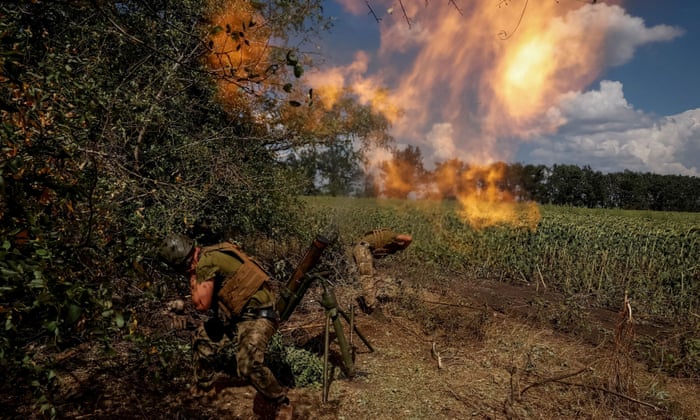 Ukrainian servicemen fire a mortar on a frontline in Donetsk region. REUTERS/Stringer TPX IMAGES OF THE DAY Photograph: Reuters
Ukrainian servicemen fire a mortar on a frontline in Donetsk region. REUTERS/Stringer TPX IMAGES OF THE DAY Photograph: Reuters
Updated at 05.06 EDT
Vladimir Putin’s war in Ukraine has turned into a ‘nightmare scenario’, says former head of British army
Russia’s ongoing war with Ukraine is not going the way that Vladimir Putin hoped, the former head of the British Army has said.
Gen Lord Richard Dannatt told Kay Burley on Sky News that Russian forces have had to “recalibrate” what they are doing as they have been unable to obtain a swift victory over the Ukrainian military.
He said:
I think the war has panned out completely differently to what Vladimir Putin imagined. This is probably his worst scenario, his nightmare scenario.
If we go back six months to 24 February… what he had in mind and what the international media was expecting was a lightning strike down from Belarus to Kyiv to topple Ukraine’s president Volodymyr Zelenskiy, change the regime in Kyiv, change the government of Ukraine and hey presto, Ukraine would come under the control of Russia.
And of course, that didn’t happen. This meant that the Russians then had to recalibrate what they were trying to do.
Updated at 04.57 EDT
 Shaun Walker
Shaun Walker
Shaun Walker reports for us on the six months since Russia invaded Ukraine:
The shock of those first hours of the war, when the unthinkable became reality, is a moment that is likely to stay with every Ukrainian for the rest of their lives.
In the chaotic first days, events moved incredibly fast. By the end of the first week, the country had already settled into a new reality in which roads were dotted with checkpoints run by locals carrying whatever arms they could get their hands on, mayors strutted around their towns in body armour organising the defence, and families endured separation from their loved ones, as millions of women and children rushed to safety abroad.
Split-second decisions could mean life or death. People whose friends had mocked them in previous weeks for hoarding food or making escape plans were now hailed as prophets. Countless families decided to leave Kyiv for the peaceful commuter towns to its west, hoping to sit out the expected attack on the city there, only to find themselves subjected to a month of terror from occupying forces, while the centre of the capital remained relatively unscathed.
Read more here: Six months of hell in Ukraine: how Putin’s crazy war reached deadlock
Updated at 04.07 EDT
Russian shelling in the Donetsk Oblast in eastern Ukraine has killed two people, according to the region’s governor.
Pavlo Kyrylenko said they were killed in the settlements of Georgievka and Kostiantynivka, according to a post on Twitter.
⚡️Governor: Russian shelling killed 2 civilians in Donetsk Oblast on Aug. 21.
Donetsk Oblast Governor Pavlo Kyrylenko said they had been killed in the settlements of Heorhiivka and Kostyantynivka.
— The Kyiv Independent (@KyivIndependent) August 22, 2022
Russia is finding it difficult to motivate and add “auxiliary forces” to its regular troops in the Donbas, the latest British intelligence update said.
On 15 August 22, Ukrainian social media channels circulated a video, which allegedly showed elements from a military unit of the self-proclaimed Luhansk People’s Republic (LPR) refusing to be part of an offensive operation, the Ministry of Defence (MoD) said.
The fighters claimed they had already fulfilled their duty by gaining control over the Luhansk Oblast and did not want to fight in the neighbouring Donetsk region – despite threats from commanders, the update said.
The MoD report added that Russia is finding it difficult to motivate its auxiliary forces to join its regular troops in the Donbas. This is leading to commanders likely resorting to using financial incentives to get troops into combat.
A reason that Russia is having this issue is that it has consistently classified its war with Ukraine as a “special military operation” which subsequently limits the state’s powers of legal coercion, the MoD said.
News agency AFP has posted a graphic showing the economic indicators impacted by Russia’s latest invasion of Ukraine.
The charts show the soaring cost of natural gas, a forecasted fall in global economic growth, the increased price of commodities and skyrocketing forecasted inflation.
Mikhail Shishkin is an award winning novelist and they write for us to argue that even if Putin dies another Putin will take his place unless Russia’s power structure is broken:
And now, here we are: in the middle of a European war, facing an unprecedented wave of refugees from Ukraine, and wondering how our politicians could have been so blind. No one listens to writers any more. The only true lesson we can draw from history is that history teaches nothing.
In Germany, intellectuals have collected thousands of signatures on a petition demanding their own government stop delivering weapons to Ukraine, because it could lead to a third world war. “We want a policy of peace, not war,” they write. But the third world war has already begun. It started in 2014. How can you cure someone’s blindness, if they want to be blind?
The question now is, how and when will this war end? The war against Nazi Germany didn’t end with Hitler’s death, but with a devastating military defeat. Putin’s death one day is inevitable, but Russia’s defeat is not.
Read more here: The west is trying to quietly forget the war in Ukraine. It does so at its own peril
Summary so far
It is 9am in Kyiv and Russia has now been at war with Ukraine for six months.
Here are where things stand this morning:
- Russian artillery fire once again pounded the Ukrainian city of Nikopol overnight, according to Ukrainian officials. Regional governor Valentyn Reznichenko said Russian forces struck the three districts of Nikopol, Kryvoriz, and Synelnykiv close to the Zaporizhzhia nuclear plant. “Nikopol was shelled with ‘Grad’ and barrel artillery three times during the night. 42 Russian shells flew into the residential quarters,” he said in a Telegram update early this morning.
- Ukraine is bracing itself for an intensification of Russian missile attacks to coincide with its independence day on Wednesday. The country’s military warned that Russia had put five cruise missile-bearing warships and submarines in the Black Sea and that Moscow was positioning air defence systems in Belarus. Large gatherings have been banned in Kyiv for four days from Monday. Ukraine’s president Volodymyr Zelenskiy warned that “Russia may try to do something particularly ugly, something particularly vicious” this week as the country celebrates its 31st anniversary of independence.
- Russian missiles hit targets near Odesa, Ukrainian officials said. Five Russian Kalibr cruise missiles have been fired from the Black Sea at the region, the regional administration spokesperson said on Monday, citing information from the southern military command. Two were shot down by Ukrainian air defences and three hit agricultural targets, but there were no casualties. Russia said on Sunday the missiles had destroyed an ammunition depot containing missiles for US-made Himars rockets, while Kyiv said a granary had been hit.
- Turkish President, Tayyip Erdogan, is planning to speak with his Russian counterpart Vladimir Putin this week to discuss the situation at the Zaporizhzhia nuclear plant and the war in Ukraine, Russian state media agency RIA Novosti cites a diplomatic source as saying.
- The daughter of an ultranationalist Russian ideologue and ally of Vladimir Putin was killed by a car bomb on the outskirts of Moscow on Saturday night. Darya Dugina, whose father is the Russian political commentator Alexander Dugin, died when the Toyota Land Cruiser she was driving was ripped apart by a powerful explosion about 12 miles (20km) west of the capital near the village of Bolshiye Vyazemy at about 9.30pm local time (1930 BST), according to investigators.
- A former member of Russia’s Duma has claimed that Russian partisans were allegedly behind the car bomb attack. Ilya Ponomarev, who was expelled for anti-Kremlin activities, alleged the explosion was the work of the National Republican Army, which he claimed was an underground group working inside Russia and dedicated to overthrowing the Putin regime. “This attack opens a new page in Russian resistance to Putinism,” he said.
- Zelenskiy warned Russia against putting Ukrainian soldiers captured during the siege of Mariupol on trial. “If this despicable court takes place, if our people are brought into these settings in violation of all agreements, all international rules, there will be abuse,” he said in a Sunday evening address. “This will be the line beyond which no negotiations are possible.”
Putin and Erdoğan to talk this week – reports
Turkish President, Tayyip Erdoğan, is planning to speak with his Russian counterpart Vladimir Putin this week to discuss the situation at the Zaporizhzhia nuclear plant and the war in Ukraine, Russian state media agency RIA Novosti cites a diplomatic source as saying.
Erdoğan said that he intends to discuss with Putin the results of his talks with Zelenskiy and UN Secretary General António Guterres in Lviv , as well as to ask the Russian president to take specific measures to resolve the situation at the Zaporizhzhia plant.
According to RIA Novosti, the source said:
Yes, such negotiations are expected this week. [Putin] outlined the topics earlier. This is the situation at the Zaporizhzhia nuclear power plant and the settlement of the Ukrainian crisis in general. Turkey continues to play its honest mediating role in this conflict, being the only country that has won the trust of both sides.”
Updated at 01.51 EDT
Daughter of Putin ally killed by car bomb in Moscow
In case you missed this earlier report, here is a quick recap by the Guardian’s Moscow correspondent, Andrew Roth.
Darya Dugina, the daughter of an ultranationalist Russian ideologue and ally of Vladimir Putin, was killed in a car bomb on the outskirts of Moscow on Saturday night.
Dugina, whose father is the Russian political commentator Alexander Dugin, died when the Toyota Land Cruiser she was driving was ripped apart by a powerful explosion about 12 miles (20km) west of the capital near the village of Bolshiye Vyazemy at about 9.30pm local time (1930 BST), according to investigators.
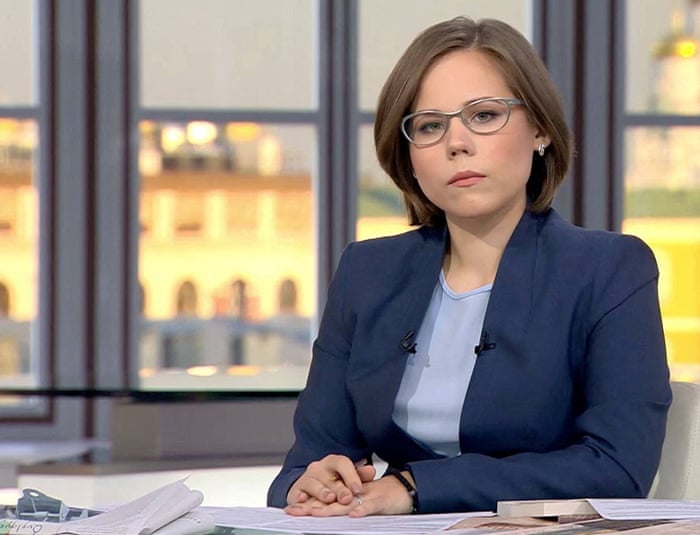 Journalist Darya Dugina, daughter of an ultranationalist Russian ideologue and ally of Vladimir Putin, was killed in a car bomb on the outskirts of Moscow on Saturday night. Photograph: TSARGRAD.TV/Reuters
Journalist Darya Dugina, daughter of an ultranationalist Russian ideologue and ally of Vladimir Putin, was killed in a car bomb on the outskirts of Moscow on Saturday night. Photograph: TSARGRAD.TV/Reuters
Prominent Russian hawks without evidence quickly blamed Kyiv for the attack, calling it an assassination attempt and demanding the Kremlin respond by targeting government officials in Kyiv.
If the car bombing is tied to the war it would mark the first time since February that the violence unleashed on Ukraine has reached the Russian capital, touching the family of a Kremlin ally near one of Moscow’s most exclusive districts.
Kyiv strongly denied the allegations. “Ukraine has absolutely nothing to do with this, because we are not a criminal state like Russia, or a terrorist one at that,” Mykhailo Podolyak, an adviser to the president, Volodymyr Zelenskiy, said in remarks broadcast on television.
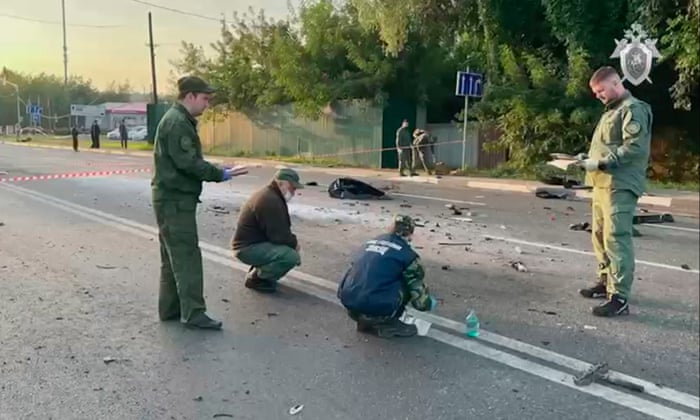 Investigators working at the scene of a car explosion on Mozhaisk highway in the Moscow region, Russia. Photograph: Russian Investigative Committee Handout/EPA
Investigators working at the scene of a car explosion on Mozhaisk highway in the Moscow region, Russia. Photograph: Russian Investigative Committee Handout/EPA
Russian artillery fire once again pounded the Ukrainian city of Nikopol overnight, according to Ukrainian officials.
Regional governor Valentyn Reznichenko said Russian forces struck the three districts of Nikopol, Kryvoriz, and Synelnykiv close to the Zaporizhzhia nuclear plant.
In an update posted to his official Telegram channel this morning, Reznichenko said:
A night of shelling and casualties.
Nikopol was shelled with ‘Grad’ and barrel artillery three times during the night. 42 Russian shells flew into the residential quarters.
In the city, two houses were destroyed, almost 50 were mutilated. Enemy shells damaged a kindergarten, shops, pharmacies, markets, a court and a bus station. The shelling caused five fires … Up to 2,000 people are without electricity.”
In the Sinelnyk district, an agricultural enterprise was reportedly destroyed as well as a school and a cultural centre.
Updated at 01.10 EDT
Ukraine braces for intensified attacks
Ukraine is bracing itself for an intensification of Russian missile attacks to coincide with its independence day on Wednesday.
The country’s military warned that Russia had put five cruise missile-bearing warships and submarines out in the Black Sea and that Moscow was positioning air defence systems in Belarus. Large gatherings have been banned in Kyiv for four days from Monday.
Ukraine’s president Volodymyr Zelenskiy warned that “Russia may try to do something particularly nasty, something particularly cruel” this week as the country celebrates its 31st anniversary of independence.
Zelenskiy warns Moscow against trial of Ukrainian soldiers
Ukraine’s president, Volodymyr Zelenskiy, has warned Russia against putting Ukrainian soldiers captured during the siege of Mariupol on trial, claiming it will risk the possibility of negotiations.
In his latest video address, president Volodymyr Zelenskiy said that if the “absurd and disgusting trial” of Ukrainian soldiers takes place in Mariupol it will eliminate the possibility of talks with Russia.
If this despicable court takes place, if our people are brought into these settings in violation of all agreements, all international rules, there will be abuse.
This will be the line beyond which no negotiations are possible.”
Shelling rocks Nikopol near nuclear plant
Artillery shells rained down on the Ukrainian city of Nikopol, close to the Zaporizhzhia nuclear plant.
Nikopol was shelled on five different occasions, regional governor Valentyn Reznichenko said in an update on Telegram.
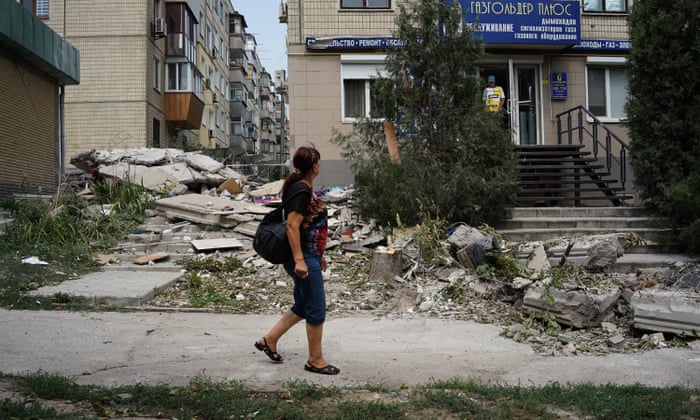 A woman walks past a shop struck by artillery shells in the Ukrainian city of Nikopol, close to the Zaporizhzhia nuclear plant. Photograph: Christopher Cherry/The Guardian
A woman walks past a shop struck by artillery shells in the Ukrainian city of Nikopol, close to the Zaporizhzhia nuclear plant. Photograph: Christopher Cherry/The Guardian
He said 25 artillery shells hit the city, causing a fire at an industrial premises and cutting power to 3,000 people.
The Russians fired 25 shells from barrel artillery at Nikopol. The shelling caused a severe fire at the enterprise – the fire destroyed the equipment.
In the city, a school was mutilated, one house was destroyed, and two dozen others were damaged. Gas furnaces and power lines are out of order. More than 3,000 Nikopol citizens are without electricity. Emergency teams are working.”
Summary and welcome
Hello and welcome back to the Guardian’s live coverage of the war in Ukraine.
I’m Samantha Lock and I will be bringing you all the latest developments for the next short while. Whether you’ve been following our coverage overnight or you’ve just dropped in, here are the latest lines.
Repeated shelling has rocked the southern Ukrainian city of Nikopol, located near the Zaporizhzhia nuclear plant, its governor has said.
Zelenskiy warned Moscow against going ahead with the trial of captured Ukrainian soldiers in his latest national address.
It is 7.30am in Ukraine. Here is everything you might have missed:
- Ukraine is bracing itself for an intensification of Russian missile attacks to coincide with its independence day on Wednesday. The country’s military warned that Russia had put five cruise missile-bearing warships and submarines in the Black Sea and that Moscow was positioning air defence systems in Belarus. Large gatherings have been banned in Kyiv for four days from Monday. Ukraine’s president Volodymyr Zelenskiy warned that “Russia may try to do something particularly ugly, something particularly vicious” this week as the country celebrates its 31st anniversary of independence.
- Artillery shells have rained down on the Ukrainian city of Nikopol, close to the Zaporizhzhia nuclear plant. Nikopol was shelled on five different occasions, regional governor Valentyn Reznichenko wrote on Telegram. He said 25 artillery shells hit the city, causing a fire at an industrial premises and cutting power to 3,000 people.
- Russian missiles hit targets near Odesa, Ukrainian officials said. Five Russian Kalibr cruise missiles have been fired from the Black Sea at the region, the regional administration spokesperson said on Monday, citing information from the southern military command. Two were shot down by Ukrainian air defences and three hit agricultural targets, but there were no casualties. Russia said on Sunday the missiles had destroyed an ammunition depot containing missiles for US-made Himars rockets, while Kyiv said a granary had been hit.
- The daughter of an ultranationalist Russian ideologue and ally of Vladimir Putin was killed by a car bomb on the outskirts of Moscow on Saturday night. Darya Dugina, whose father is the Russian political commentator Alexander Dugin, died when the Toyota Land Cruiser she was driving was ripped apart by a powerful explosion about 12 miles (20km) west of the capital near the village of Bolshiye Vyazemy at about 9.30pm local time (1930 BST), according to investigators.
- A former member of Russia’s Duma has claimed that Russian partisans were allegedly behind the car bomb attack. Ilya Ponomarev, who was expelled for anti-Kremlin activities, alleged the explosion was the work of the National Republican Army, which he claimed was an underground group working inside Russia and dedicated to overthrowing the Putin regime. “This attack opens a new page in Russian resistance to Putinism,” he said.
- Zelenskiy warned Russia against putting Ukrainian soldiers captured during the siege of Mariupol on trial. “If this despicable court takes place, if our people are brought into these settings in violation of all agreements, all international rules, there will be abuse,” he said in a Sunday evening address. “This will be the line beyond which no negotiations are possible.”
- The leaders of Britain, France, Germany and the US urged military restraint around the Russian-held Zaporizhzhia nuclear plant in Ukraine. In a phone call, the four leaders also called for a “quick visit” to the nuclear site by independent inspectors of the International Atomic Energy Agency, according to German chancellor Olaf Scholz’s spokesperson.
- Four more ships carrying food left Ukraine’s ports, Turkey’s defence ministry said, bringing the total number of vessels to leave Ukraine’s Black Sea ports under a UN-brokered grain export deal to 31.
Source by www.theguardian.com














































